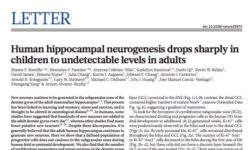WTF! No neurogenesis in humans??

The latest study in the saga that is adult neurogenesis was just published today: Sorrells et al, (2018) Human hippocampal neurogenesis drops sharply in children to undetectable levels in adults. Nature, doi:10.1038/nature25975 I wrote a brief piece for Nature News and Views but since they have very strict space limitations I…